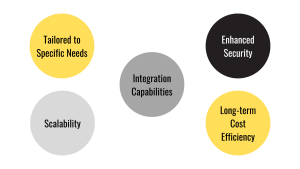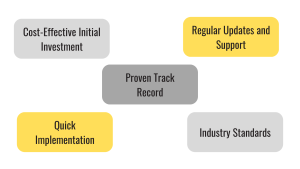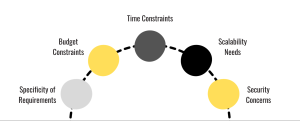Custom Software vs. Off-the-Shelf Solutions
Introduction Technology plays a pivotal role in determining a company’s success. One crucial decision that businesses often face is whether to opt for custom software de...

Introduction
Technology plays a pivotal role in determining a company’s success. One crucial decision that businesses often face is whether to opt for custom software development or rely on off-the-shelf solutions. Each option comes with its own set of advantages and drawbacks, and choosing the right approach is paramount to meeting specific business needs. In this article, we will delve into the detailed comparison between custom software and off-the-shelf solutions, helping businesses understand when and why custom development might be the better option.
Understanding Custom Software
Custom software, also known as bespoke or tailor-made software, is designed and developed to meet the unique requirements of a specific business. It is crafted from the ground up, taking into account the organisation’s processes, workflows, and objectives. This personalised approach ensures that the software aligns seamlessly with the company’s operations, providing a tailored solution that addresses specific challenges.
Custom Software Benefits

- Tailored to Specific Needs: Custom software is built to fit the exact needs of a business, allowing for precise alignment with processes and goals.
- Scalability: As the business grows, custom software can easily scale to accommodate increased data, users, and functionality.
- Integration Capabilities: Custom solutions can be seamlessly integrated with existing systems, ensuring a smooth flow of data across the organisation.
- Enhanced Security: Since the codebase is unique to the organisation, custom software can be designed with robust security measures, reducing the risk of vulnerabilities.
- Long-term Cost Efficiency: While the initial development cost may be higher, custom software can lead to long-term cost savings by eliminating the need for frequent updates and modifications often associated with off-the-shelf solutions.
Understanding Off-the-Shelf Software
Off-the-shelf software, on the other hand, refers to pre-packaged applications that are developed to cater to a broader audience. These solutions are designed with a general set of features to address common industry needs, making them readily available for purchase and use by a wide range of businesses.
Off-the-Shelf Software Benefits

- Cost-Effective Initial Investment: Off-the-shelf solutions generally have a lower upfront cost, making them an attractive option for businesses with budget constraints.
- Quick Implementation: Ready-made software can be deployed rapidly since it doesn’t require the time-consuming development process associated with custom solutions.
- Proven Track Record: Established off-the-shelf software often comes with a track record of success, having been tested and used by numerous businesses.
- Regular Updates and Support: Reputable software vendors provide regular updates, patches, and customer support to address issues and improve functionality.
- Industry Standards: Off-the-shelf solutions often adhere to industry standards, ensuring compliance and compatibility with widely used technologies.
Choosing Between Custom and Off-the-Shelf
The decision between custom and off-the-shelf software ultimately depends on various factors, and businesses must carefully evaluate their unique needs, goals, and constraints. Here are some key considerations.

- Specificity of Requirements: If your business has highly specific requirements that cannot be met by generic software, custom development may be the better choice.
- Budget Constraints: While custom software can lead to long-term cost efficiency, businesses with tight budgets may initially benefit from the lower upfront costs of off-the-shelf solutions.
- Time Constraints: If your business needs a solution quickly, off-the-shelf software may be the more expedient choice. Custom development, although tailored, typically requires a longer development cycle.
- Scalability Needs: If your business anticipates rapid growth and scalability is a priority, custom software allows for flexible and seamless expansion.
- Security Concerns: Industries with stringent security requirements may find custom software more suitable, as it allows for the implementation of personalised security measures.
Conclusion
In conclusion, the choice – custom software vs. off-the-shelf solutions – is a critical decision that depends on the unique characteristics and requirements of each business. While off-the-shelf software provides a quick and cost-effective solution, custom development offers a personalised approach that can be a strategic advantage in the long run. Careful consideration of factors such as specificity of needs, budget constraints, time requirements, scalability, and security concerns will guide businesses in making the right choice to propel their operations forward in the ever-evolving digital landscape.